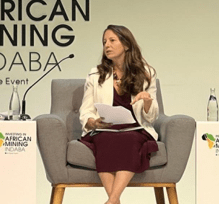By Kizito CUDJOE
The President and Chief Executive Officer of the Natural Resource Governance Institute (NRGI), Suneeta Kaimal, has called on wealthier countries to take greater responsibility for companies operating from their jurisdictions and hold them accountable for any wrongdoing in Africa.
Kaimal warned that without stronger oversight, African countries would continue to bear the consequences of corporate misconduct, hindering efforts to create a fairer and more sustainable world for current and future generations.
The NRGI boss, who spoke at the Mining Indaba 2025, therefore added that the UN Panel on Critical Energy Transition Minerals is an opportunity for catalytic actions that bring together the voices, the resources and the global leadership necessary for Africans and Africa to at last see benefits from their minerals.
Her comments come against her disclosure that “Our research identified more than 50 cases of corruption in the licensing and contracting of transition minerals projects alone, with cases found in 10 African countries”.
The companies involved, she said, are often based in the world’s wealthiest or most powerful countries, including Australia, Canada, China, Russia, Switzerland, the UK and the US. Each is a signatory to the U.N. Convention Against Corruption, which requires countries to criminalise foreign bribery and—except for China—signatories to the OECD Anti-Bribery Convention.
“Yet, Transparency International’s latest Exporting Corruption report found that only 2 of 47 countries analysed are actively enforcing foreign bribery laws (the U.S. and Switzerland),” she added.
During the panel discussion on the role of governments in developing value chains for critical energy transition minerals with moderator Divyam Nagpal, Kaimal pointed to a 2023 survey by the Intergovernmental Forum on Mining, Minerals, Metals and Sustainable Development.
She said the report found that more governments cited value addition as the primary driver of their critical mineral strategies than any other factor.
Kaimal said the U.N. Panel’s report emphasises value addition, economic diversification and benefit-sharing as crucial steps forward. She outlined three key recommendations:
“Too often, the ambitions of consumer countries in the Global North dominate discussions on energy transition and security. The U.N. Panel was a step forward in ensuring that low- and middle-income producers, civil society and industry leaders have a seat at the table. Multi-stakeholder participation should be the norm, not an exception,” she said.
Kaimal called for stronger commitments from global powers to support supply chain equity. She cited the Lobito Corridor as an example of a project that could benefit Africa but warned that without strategic interventions, it could reinforce existing resource extraction models rather than drive broader economic growth.
“Governments need support to enhance planning capacity, access concessional financing and address infrastructure bottlenecks in energy and transport,” she said.
Kaimal emphasised the role of governance in creating responsible mineral supply chains. “Good governance supports environmental and social protections, ensures laws are enforced, and fosters trust between companies, governments and communities,” she said.
She warned that weak governance leads to corruption, environmental degradation and social injustice, deterring investment and increasing uncertainty in the sector.
“The only way mining companies can attract the level of investment needed to meet soaring demand for transition minerals is by reducing risks that scare investors away,” she added.
“Disputes with governments or communities create uncertainty, drive up costs and make the sector less attractive to capital. Good governance benefits not only communities and governments but also the private sector.”
Kaimal urged global leaders to strengthen anti-corruption measures and enforce accountability mechanisms to ensure the benefits of Africa’s mineral wealth are shared more equitably.
The 2025 Mining Indaba in Cape Town, South Africa, was held under the theme ‘Future-Proofing African Mining, Today!’










